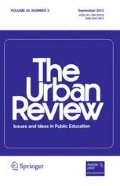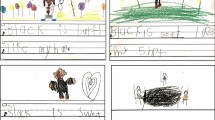Abstract
In the wake of racial violence in urban schools and society, we question, “Can the field of urban education love blackness and Black lives unconditionally and as preconditions to humanity? What does it look like to (re)imagine urban classrooms as sites of love? As educators, how might we utilize a pedagogy of love as an embodied practice that influences holistic teaching? How might we utilize a pedagogy of love to include Black youths’ racialized and gendered life histories and experiences and their language and literacy practices? We outline and discuss five types of violence in schools (physical, symbolic, linguistic, curricula/pedagogical, and systemic school violence) which interfere with the creation and sustainability of revolutionary love in urban schools. We present examples of ‘fake love’ and provide the current backdrop. We operationalize revolutionary love and offer Afrocentric praxis and African Diaspora Literacy as antidotes to anti-Black types of violence that many students experience in urban schools.
Similar content being viewed by others
References
Adams, J., & Fair, R. (2003). Where is the love [Recorded by The Black Eyed Peas]. Elephunk [CD]. Santa Monica, CA: Interscope.
Asante, M. K. (2007). An Afrocentric manifesto. Oxford, UK: Polity.
Au, W., Brown, A., & Calderon, D. (2016). Rethinking the multicultural root of US curriculum. New Yourk, NY: Teachers College Press.
Baker-Bell, A. (2017). “I can switch my language, but I can’t switch my skin”: What teachers must understand about linguistic racism. In E. Moore Jr., A. Michael, & M. W. Penick-Parks (Eds.), The guide for white women who teach black boys (pp. 97–109). Thousand Oaks, CA: Corwin Publishing.
Bell, D. (1992). Faces at the bottom of the well. New York, NY: Basic Books.
Boutte, G. S. (2008). Beyond the illusion of diversity: How early childhood teachers can promote social justice. The Social Studies, 99(4), 165–173.
Boutte, G. S. (2012). Urban Schools: Challenges and possibilities for early childhood and elementary education. Urban Education, 47(2), 515–550.
Boutte, G. S. (2016). Educating African American students: And how are the children? New York, NY: Routledge.
Boutte, G. S., Johnson, G. L., Wynter-Hoyt, K., & Uyoata, U. E. (2017). Using African Diaspora literacy to heal and restore the souls of Black folks. International critical childhood policy studies journal, 6(1), 66–79.
Boykin, A. W. (1994). Afrocultural expression and its implication for schooling. In E. Hollins, J. King, & W. Hayman (Eds.), Teaching diverse populations: Formulating a knowledge base (pp. 243–273). Albany, NY: State University of New York Press.
Butchart, R. E. (2010). Black hopes, white power: Emancipation, reconstruction, and the legacy of unequal schooling in the U.S. South, 1861–1880. Paedagogica Historica, 46, 33–50.
Carey, R., Yee, L., & DeMatthews, D. (2018). Power, penalty, and critical praxis: Employing intersectionality in educator practices to achieve school equity. The Educational Forum, 82(1), 111–130. https://doi.org/10.1080/00131725.2018.1381793.
Chen, T. (2017). A high school is investigating after students discussed “stringing a N***er up” in a group chat. Buzzfeed.com Retrieved December 27, 2017 from https://www.buzzfeed.com/tanyachen/high-school-racist-group-chat?utm_term=.ejZgKE0O9#.wfy7da2lx.
Cridland-Hughes, S., & King, L. J. (2015). “Killing me softly”: How violence comes from the curriculum we teach. In K. Fasching-Varner & N. D. Hartlep (Eds.), The assault on communities of color (pp. 99–102). Lanham, MD: Rowman & Littlefield.
Dei, G. S. (2012). Indigenous anti-colonial knowledge as ‘heritage knowledge ‘for promoting Black/African education in diasporic contexts. Decolonization: Indigeneity, Education & Society, 1(1), 102–119.
Dillard, C. B. (2012). Learning to (Re)member the things we’ve learned to forget. Endarkened feminisms, spirituality, & the sacred nature of research & teaching. New York, NY: Peter Lang.
Douglass, F. (1995). Narrative of the life of Frederick Douglass. Boston, MA: Dover Publications.
DuBois, W. E. B. (1903). The souls of Black folk. New York, NY: First Vintage Books/The Library of America Edition.
Dumas, M. J. (2014). ‘Losing an arm’: Schooling as a site of black suffering. Race Ethnicity and Education, 17(1), 1–29.
Fanon, F. (1963). The wretched of the earth. New York, NY: Grove.
Foner, P. S. (1999). Frederick Douglass: Selected speeches and writing. Chicago, IL: Lawrence Hill.
Fu-Kiau, K. K. B., & Lukondo-Wamba, A. M. (1988). Kindezi: The Kongo art of babysitting. Baltimore, MD: Imprint Editions.
Gutierrez, L. (2017). Hangman with n-word gets students suspended, employee possibly fired. Kansascity.com. Retrieved December 27, 2017 from http://www.kansascity.com/news/nation-world/article187518008.html.
Helgeland, B. (Director), Helgeland, B. (Writer), & Tull, T. (Producer). (2013). 42 [Video file].
Hilliard, A. G. (2002). African power: Affirming African indigenous socialization in the face of the culture wars. Gainesville, FL: Makare Pub.
Hilliard, A. G. (2009). What do we need to know now? In W. Au (Ed.), Rethinking multicultural education: Teaching for racial and cultural justice (pp. 21–36). Milwaukee, WS: Rethinking Schools, Ltd.
Hooks, B. (1994). Teaching to transgress. Education as the practice of freedom. New York, NY: Routledge.
Hooks, B. (2000). All about love. New visions New York, NY: Harper.
Howard, T. (2014). Black maled: Perils and promises in the education of African American males. New York, NY: Teacher College Press.
Jackson, T. O., & Flowers, N. C. (2017). Much to lose: Black mother educators respond to Donald Trump’s comments about schools. International Journal of Qualitative Studies in Education, 30(10), 994–998.
Johnson, L. L. (2016). Using critical race theory to explore race-based conversations through a critical family book club. Literacy Research: Theory, Method, and Practice, 65, 300–315.
Johnson, L. L. (2017). The racial hauntings of one Black male professor and the disturbance of the self(ves): Self-actualization and racial storytelling as pedagogical practices. Journal of Literacy Research, 49(4), 1–27. https://doi.org/10.1177/086296X1773379.
Johnson, L. L., & Bryan, N. (2016). Using our voices, losing our bodies: Michael Brown, Trayvon Martin, and the spirit murders of Black male professors in the academy. Race Ethnicity and Education, 20(2), 163–177.
Johnson, L. L., Jackson, J., Stovall, D. O., & Baszile, D. T. (2017). “Loving blackness to death”: (Re)Imagining ELA classrooms in a time of racial chaos. English Journal, 106, 60–66.
King, J. E. (1991). Dysconscious racism: Ideology, identity, and the miseducation of teachers. The Journal of Negro Education, 60(2), 133–146.
King, J. E. (1992). Diaspora literacy and consciousness in the struggle against miseducation in the Black community. Journal of Negro Education, 61(3), 317–340.
King, J. E. (Ed.). (2005). Black education: A transformative research and action agenda for the new century. New York, NY: Routledge.
King, J. E. (2017). Who will make America great again? ‘Black people, of course…’. International Journal of Qualitative Studies in Education, 30(10), 946–956. https://doi.org/10.1080/09518398.2017.1312605.
King, J. E., & Swartz, E. E. (2014). “Re-membering” history in student and teacher learning. An Afrocentric culturally informed praxis. New York, NY: Routledge.
King, J. E., & Swartz, E. E. (2016). The Afrocentric praxis of teaching for freedom: Connecting culture to learning. New York, NY: Routledge.
Ladson-Billings, G. (2011). Boyz to men? Teaching to restore Black boys’ childhood. Race Ethnicity and Education, 14(1), 7–15.
Lynn, M. (1999). Toward a critical race pedagogy: A research note. Urban Review, 33(5), 606–626.
Lynn, M., Jennings, M. E., & Hughes, S. (2013). Critical race pedagogy 2.0: Lessons from Derrick Bell. Race Ethnicity and Education, 16(4), 603–628.
Matias, C. E. (2016). Feeling white: whiteness, emotionality, and education. Boston, MA: Sense Publishers.
Matias, C. E., & Allen, R. L. (2013). Loving whiteness to death: Sadomasochism, emotionality, and the possibility of humanizing love. Berkeley Review of Education, 4, 285–309.
Milner, H. R. (2010). Start where you are, but don’t stay there: Understanding opportunity gaps, diversity and teaching in today’s classrooms. Cambridge, MA: Harvard Education Press.
Milner, R. H., & Lomotey, K. (Eds.). (2014). Handbook of urban education. New York, NY: Routledge.
Musca, T. (Producer), & Menendez, R. (1988). (Director). (1988). Stand and deliver [Motion picture]. US: Warner Brothers.
Phillips, K. (2017). ‘That’s how people like you get shot’: Video shows high school teacher threatening his student. Washingtonpost.com Retrieved 15 December 2017, from https://www.washingtonpost.com/news/education/wp/2017/11/07/thats-how-people-like-you-get-shot-video-shows-high-school-teacher-threatening-his-student/?utm_term=.51ca247fb0bb.
Rooney, C., & Morales, M. (1991). Real Love [Recorded by Mary J. Blige]. What’s the 411 [CD]. New York, NY: Uptown.
Ruiz-Sealey, Y. (2016). Why Black girls’ literacies matter: New literacies for a new era. English Education, 48(4), 290–298.
Shujaa, M. J. (1994). Too much schooling, too little education: A paradox of Black life in White societies. Trenton, NJ: Africa World Press.
Singer, J. (2015). The miseducation of African American male college athlete. In E. Comeaux (Ed.), Introduction to intercollegiate athletics (pp. 193–206). Baltimore, MD: Johns Hopkins Press.
Stovall, D. O. (2013). “Fightin’ the Devil 24/7”: Context, community, and critical race praxis in education. In M. Lynn & A. D. Dixson (Eds.), Handbook of critical race theory in education: CRT and innovations in educational research methodologies (pp. 287–301). New York, NY: Routledge.
“Sweet Honey in the Rock - Ella’s Song.” YouTube, YouTube, 2 Dec. 2008, www.youtube.com/watch?v=U6Uus–gFrc.
Thomas. (2017). The hate u give. New York, NY: Harper Collins Publishers.
Warren, C. (2017). Urban preparation: Young Black men moving from Chicago’s South side to success in higher education.
Woodson, C. G. (1933/1990). The mis-education of the Negro. Trenton, NJ: Africa World Press.
Author information
Authors and Affiliations
Corresponding author
Rights and permissions
About this article
Cite this article
Johnson, L.L., Bryan, N. & Boutte, G. Show Us the Love: Revolutionary Teaching in (Un)Critical Times. Urban Rev 51, 46–64 (2019). https://doi.org/10.1007/s11256-018-0488-3
Published:
Issue Date:
DOI: https://doi.org/10.1007/s11256-018-0488-3




